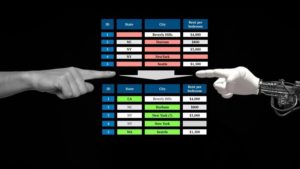
MIT Researchers Create System that Cleans Messy Data Tables Automatically
May 17, 2021 — MIT researchers have created a new system that automatically cleans “dirty data” — the typos, duplicates, missing values, misspellings, and inconsistencies dreaded by data analysts, data engineers, and data scientists. The system, called PClean, is the latest in a series of domain-specific probabilistic programming languages written by researchers at the Probabilistic Computing Project that aim to simplify and automate the development of AI applications (others include one for 3D perception via inverse graphics and another for modeling time series and databases).
According to surveys conducted by Anaconda and Figure Eight, data cleaning can take a quarter of a data scientist’s time. Automating the task is challenging because different datasets require different types of cleaning, and common-sense judgment calls about objects in the world are often needed (e.g., which of several cities called “Beverly Hills” someone lives in). PClean provides generic common-sense models for these kinds of judgment calls that can be customized to specific databases and types of errors.
PClean uses a knowledge-based approach to automate the data cleaning process: Users encode background knowledge about the database and what sorts of issues might appear. Take, for instance, the problem of cleaning state names in a database of apartment listings. What if someone said they lived in Beverly Hills but left the state column empty? Though there is a well-known Beverly Hills in California, there’s also one in Florida, Missouri, and Texas … and there’s a neighborhood of Baltimore known as Beverly Hills. How can you know in which the person lives? This is where PClean’s expressive scripting language comes in. Users can give PClean background knowledge about the domain and about how data might be corrupted. PClean combines this knowledge via common-sense probabilistic reasoning to come up with the answer. For example, given additional knowledge about typical rents, PClean infers the correct Beverly Hills is in California because of the high cost of rent where the respondent lives.

MIT researchers have created a new system that automatically cleans “dirty data” — the typos, duplicates, missing values, misspellings, and inconsistencies dreaded by data analysts, data engineers, and data scientists.
Alex Lew, the lead author of the paper and a PhD student in the Department of Electrical Engineering and Computer Science (EECS), says he’s most excited that PClean gives a way to enlist help from computers in the same way that people seek help from one another. “When I ask a friend for help with something, it’s often easier than asking a computer. That’s because in today’s dominant programming languages, I have to give step-by-step instructions, which can’t assume that the computer has any context about the world or task — or even just common-sense reasoning abilities. With a human, I get to assume all those things,” he says. “PClean is a step toward closing that gap. It lets me tell the computer what I know about a problem, encoding the same kind of background knowledge I’d explain to a person helping me clean my data. I can also give PClean hints, tips, and tricks I’ve already discovered for solving the task faster.”
Co-authors are Monica Agrawal, a PhD student in EECS; David Sontag, an associate professor in EECS; and Vikash K. Mansinghka, a principal research scientist in the Department of Brain and Cognitive Sciences.
What innovations allow this to work?
The idea that probabilistic cleaning based on declarative, generative knowledge could potentially deliver much greater accuracy than machine learning was previously suggested in a 2003 paper by Hanna Pasula and others from Stuart Russell’s lab at the University of California at Berkeley. “Ensuring data quality is a huge problem in the real world, and almost all existing solutions are ad-hoc, expensive, and error-prone,” says Russell, professor of computer science at UC Berkeley. “PClean is the first scalable, well-engineered, general-purpose solution based on generative data modeling, which has to be the right way to go. The results speak for themselves.”
PClean builds on recent progress in probabilistic programming, including a new AI programming model built at MIT’s Probabilistic Computing Project that makes it much easier to apply realistic models of human knowledge to interpret data. PClean’s repairs are based on Bayesian reasoning, an approach that weighs alternative explanations of ambiguous data by applying probabilities based on prior knowledge to the data at hand. “The ability to make these kinds of uncertain decisions, where we want to tell the computer what kind of things it is likely to see, and have the computer automatically use that in order to figure out what is probably the right answer, is central to probabilistic programming,” says Lew.
PClean makes it cheaper and easier to join messy, inconsistent databases into clean records, without the massive investments in human and software systems that data-centric companies currently rely on. This has potential social benefits — but also risks, among them that PClean may make it cheaper and easier to invade peoples’ privacy, and potentially even to de-anonymize them, by joining incomplete information from multiple public sources.
Mansinghka and Lew are excited to help people pursue socially beneficial applications. They have been approached by people who want to use PClean to improve the quality of data for journalism and humanitarian applications, such as anticorruption monitoring and consolidating donor records submitted to state boards of elections. Agrawal says she hopes PClean will free up data scientists’ time, “to focus on the problems they care about instead of data cleaning. Early feedback and enthusiasm around PClean suggest that this might be the case, which we’re excited to hear.”
Click here to read the full announcement.
Source: MIT






























